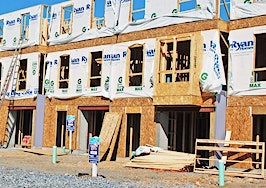- Throughout the nation, two-thirds of the 146 metros measured in the second quarter of 2016 saw homebuilding lacking behind employment growth.
- The first two cities reported by NAR with the biggest gap between employment growth and single-family housing permits were in California: San Jose and the Bay Area.
- In Houston, the three-year change in employment to the total permit ratio was 1.9, with 158,364 new total permits.
As the job market continues to improve, the need for more properties follows suit. According to a National Association of Realtors Metropolitan Median Area Prices and Affordability and Housing Affordability Index, homebuilding of all housing types was under-performing in about two-thirds of the 146 metros measured in the second quarter of 2016.
NAR measured home construction compared with the number of newly employed workers to determine whether builders are able to keep pace at a sustainable level.
Overall, inventory was failing to keep up with the demand for housing in many parts of the country during the second quarter, according to NAR. At the end of the second quarter of the year, there were 2.12 million existing homes for sale, which is lower than the number of homes available the same time the previous year.
The lack of inventory in parts of the country drove more the 40 percent of the nation’s listings to sell for more than the list price, NAR says.
[Tweet “San Jose had the largest gap between employment growth and SFH permits”]
Unsurprisingly, California cities ranked in the top two spots for three-year change (2012-2014) in employment to single-family permits, marking strong economic areas struggling to keep up with demand.
San Jose-Sunnyvale-Santa Clara had the largest ratio of three-year change in employment compared with single-family home permits, NAR says, at 22.6. The average annual employment change in the area was 4.3 percent, and the three-year change in total permits was 23,333. Of all the permits, only 5,232 were single-family permits, suggesting a strong focus on apartment and townhouse development.
The ratio of employment change to total housing permits from 2012 to 2014 was 5.1.
In nearby San Francisco-Oakland-Fremont, the three-year change in total permits was higher, at 30,086, and 10,470 of those permits were dedicated to single-family homes. The ratio of new employment to single-family homes was 22.4.
The growth in employment compared with housing stock additions was also strong in New York-N. New Jersey-Long Island and New York-Wayne-White Plains, according to the data, with both seeing a total permit change of 114,720 from 2012 to 2014.
Employment to single-family home permits was 13.9 in New-N. New Jersey-Long Island, and 10.0 in the metro covering Wayne and White Plains.
The new employment total permit ratio change was a respective 3.5 and 2.5 in the New York metro areas. Both areas had a three-year change of 28,753 for single-family permits. Employment was fairly slow to grow in both areas, with increases of 1.6 percent and 1.8 percent reported.
The ratio change in employment to total building permits was 3.9 in Miami-Fort Lauderdale-Miami Beach, and the metro had an employment change to single-family permit ratio increase of 11.1. Employment increased an average of 2.8 percent annually in the metro. In total, Miami saw a three-year change of 17,249 single-family home permits, NAR says.
Chicago-Naperville-Joliet had a three-year employment to total permit ratio of 4.4 from 2012 to 2014. With 1.6 percent average annual employment growth, the metro area had a total change in permits of 36,663. The ratio change of employment to single-family homes was 7.8, bringing a total of 20,642 single-family permits in three years.
The three-year change in employment to growth of the single-family housing market was a ratio of 3.9 in Baltimore-Towson from 2012 to 2014. The metro area had a total increase of 13,174 housing permits during that time frame. Annually, employment grew 1.8 percent in the three years covered in the Baltimore area.
In Houston-Baytown-Sugar Land, the three-year change in employment to the total permit count was 1.9 from 2012 to 2014, NAR says, with an average employment growth rate of 3.7 percent during the same time frame. In terms of total permits, the metro saw a massive three-year change of 158,364. The three-year change in employment to single-family permits was 3.0, with 101,485 new permits in that housing category.












